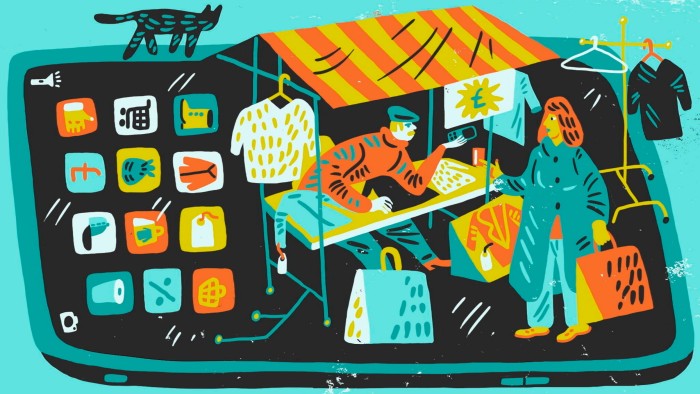Unlock the Editor’s Digest for free
Roula Khalaf, Editor of the FT, selects her favourite stories in this weekly newsletter.
Maisie McInnes, from the northern English city of Hull, started selling used clothes online to help save for a deposit on a house. She began by listing old items from her own wardrobe, but now spends a couple of hours every week browsing local charity shops for stock to resell at online marketplace Vinted, where she has sold more than 6,000 items since 2019.
McInnes is part of a global market for second-hand clothing worth an estimated $256bn, according to online thrift store ThredUp. That market is expected to continue growing as more people find value in buying and wearing used goods.
For many people, buying and selling goods online — from clothes to gadgets, memorabilia and much else — has become a full-time job. For others, it is a convenient way to make extra money while studying or working.
McInnes says she genuinely enjoys selling her own and others’ old clothes. “I really like shopping for bargains in charity shops and this has given me a way to do that — and to help other people become more sustainable — while also making money,” she says.
But selling goods online takes preparation and practice.
Navigating the Digital World
“It’s all marketing at the end of the day,” says McInnes. “How you photograph it and describe it makes all the difference.” She always photographs her clothes against a clean, bright background, making sure to iron out any creases beforehand. “I tend to think, if someone hasn’t taken care in the photograph, can I trust them to take care of the product?”
McInnes’ descriptions typically include a detailed summary of the item, including any flaws, along with suggestions of occasions it might be suitable for. She will also often include ideas for how to style the item.
London-based Chi-Chi Nwuba, who also makes money selling clothes online, generally writes descriptions that include keywords she expects buyers to use in their searches on the Vinted and Depop apps.
“People might type things like ‘little black dress’, so put that in your description,” she says. She also tries to game resale sites’ algorithms, often by posting new items at regular intervals throughout the day, and keeps up to date with other buyers and sellers on TikTok to hear their latest tips.
Top tips for buying and selling online
✅ Do
-
Have a good idea in advance of how much your item should be worth
-
Make sure there is a good photo
-
Think about the keywords that buyers or sellers might use to describe an item
-
Make sure you check if the website or app has age restrictions
❌ Don’t
-
Click suspicious links in adverts or messages
-
Move conversations to external messaging services
-
Lie about an item’s condition or quality
-
Rush into a purchase before checking sizing and authenticity
But online traders also need to be aware of possible scams, from fake listings to fraudulent links. Action Fraud, the UK’s national fraud reporting service, received around 45,000 reports of scams related to online shopping and auctions in the 12 months to June 2025, with losses totalling over £46mn.
McInnes says she has dodged several scams during her time on resale sites such as Vinted and Depop. The most common one involves messages from people claiming to be prospective buyers who ask her to click links to external websites.
The people sending the messages typically say these links will enable her to receive payment, but McInnes suspects they are designed to trick her into sharing personal details such as passwords and bank credentials.
She also notes that scammers often want to move the conversation to external messaging services where suspicious comments cannot be flagged, but says users should never have to leave the official resale website or app in order to complete a transaction.
Nwuba has also witnessed multiple scams on sites such as Vinted and Depop, both as a buyer and a seller. To avoid them she keeps an eye on typical prices so she can spot anything that looks too unusual.
“If you see something that’s really cheap and the price looks too good to be true then, I’m sorry, but it probably isn’t legitimate,” says Nwuba.
Vinted and Depop say they respond to reports of suspicious activity, and proactively warn buyers and sellers to keep all of their interactions within the app. Both companies say they will provide refunds for any items bought directly through their apps that don’t arrive, arrive damaged, or are significantly different to how they were described.
Nwuba also watches out, in particular, for “any weird usernames or usernames that don’t really make sense”. Users without reviews are also “a red flag”, she adds, although she says this made it harder to attract buyers when she first started listing her own items for sale. “You sometimes have to sell your first things at a bit of a discount before you get that first review and start looking trustworthy.”
Both Nwuba and McInnes say that online reselling is fundamentally a customer service industry where your reputation matters. “The most important thing is being honest about the quality,” Nwuba says. “If it’s slightly worn, then just say that, because people appreciate the truth.”
Shawn Grain Carter, an associate professor at the Fashion Institute of Technology in New York, says online retail sites have made second-hand shopping much more accessible.
Carter says young people are “leading the charge because they’re often very focused on . . . sustainability,” but adds that Gen Z is also “inspiring older generations”.
